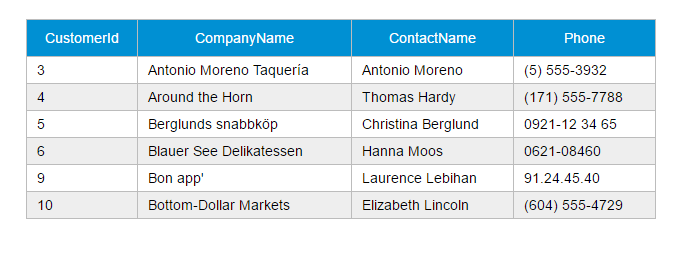如果Web服务器无法处理PUT, PATCH和DELETE这种REST风格的请求,你可以启用enulateHTTP现象。启用该选项后,请求会以普通的POST方法发出,并且HTTP头信息的X-HTTP-Method-Override属性会设置为实际的HTTP方法。
Vue.http.options.emulateHTTP = true;
emulateJSON的作用
如果Web服务器无法处理编码为application/json的请求,你可以启用emulateJSON选项。启用该选项后,请求会以application/x-www-form-urlencoded作为MIME type,就像普通的HTML表单一样。
Vue.http.options.emulateJSON = true;
response对象
response对象包含以下属性:
方法
类型
描述
text()
string
以string形式返回response body
json()
Object
以JSON对象形式返回response body
blob()
Blob
以二进制形式返回response body
属性
类型
描述
ok
boolean
响应的HTTP状态码在200~299之间时,该属性为true
status
number
响应的HTTP状态码
statusText
string
响应的状态文本
headers
Object
响应头
注意:本文的vue-resource版本为v0.9.3,如果你使用的是v0.9.0以前的版本,response对象是没有json(), blob(), text()这些方法的。
CURD示例
提示:以下示例仍然沿用上一篇的组件和WebAPI,组件的代码和页面HTML代码我就不再贴出来了。
GET请求
var demo = new Vue({ el: '#app', data: { gridColumns: ['customerId', 'companyName', 'contactName', 'phone'], gridData: [], apiUrl: 'http://211.149.193.19:8080/api/customers' }, ready: function() { this.getCustomers() }, methods: { getCustomers: function() { this.$http.get(this.apiUrl) .then((response) => { this.$set('gridData', response.data) }) .catch(function(response) { console.log(response) }) } } })
这段程序的then方法只提供了successCallback,而省略了errorCallback。
catch方法用于捕捉程序的异常,catch方法和errorCallback是不同的,errorCallback只在响应失败时调用,而catch则是在整个请求到响应过程中,只要程序出错了就会被调用。
在then方法的回调函数内,你也可以直接使用this,this仍然是指向Vue实例的:
getCustomers: function() { this.$http.get(this.apiUrl) .then((response) => { this.$set('gridData', response.data) }) .catch(function(response) { console.log(response) }) }
为了减少作用域链的搜索,建议使用一个局部变量来接收this。
JSONP请求
getCustomers: function() { this.$http.jsonp(this.apiUrl).then(function(response){ this.$set('gridData', response.data) }) }
POST请求

